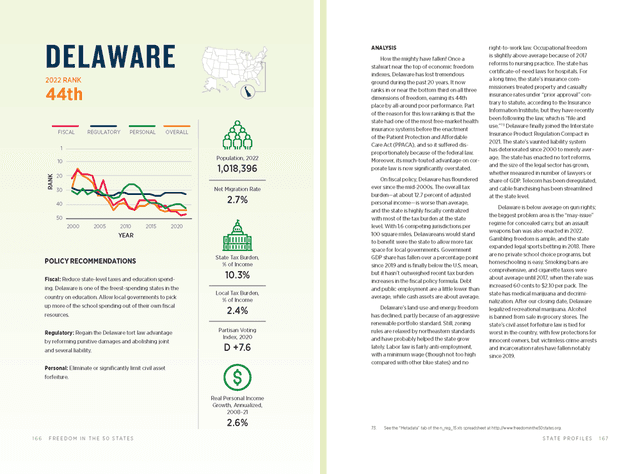Policy Recommendations
- Fiscal Reduce state-level taxes and education spending. Delaware is one of the freest-spending states in the country on education. Allow local governments to pick up more of the school spending out of their own fiscal resources.
- Regulatory Regain the Delaware tort law advantage by reforming punitive damages and abolishing joint and several liability.
- Personal Eliminate or significantly limit civil asset forfeiture.
Analysis
How the mighty have fallen! Once a stalwart near the top of economic freedom indexes, Delaware has lost tremendous ground during the past 20 years. It now ranks in or near the bottom third on all three dimensions of freedom, earning its 44th place by all-around poor performance. Part of the reason for this low ranking is that the state had one of the most free-market health insurance systems before the enactment of the Patient Protection and Affordable Care Act (PPACA), and so it suffered disproportionately because of the federal law. Moreover, its much-touted advantage on corporate law is now significantly overstated.
On fiscal policy, Delaware has floundered ever since the mid-2000s. The overall tax burden—at about 12.7 percent of adjusted personal income—is worse than average, and the state is highly fiscally centralized with most of the tax burden at the state level. With 1.6 competing jurisdictions per 100 square miles, Delawareans would stand to benefit were the state to allow more tax space for local governments. Government GDP share has fallen over a percentage point since 2019 and is finally below the U.S. mean, but it hasn’t outweighed recent tax burden increases in the fiscal policy formula. Debt and public employment are a little lower than average, while cash assets are about average.
Delaware’s land-use and energy freedom has declined, partly because of an aggressive renewable portfolio standard. Still, zoning rules are relaxed by northeastern standards and have probably helped the state grow lately. Labor law is fairly anti-employment, with a minimum wage (though not too high compared with other blue states) and no right-to-work law. Occupational freedom is slightly above average because of 2017 reforms to nursing practice. The state has certificate-of-need laws for hospitals. For a long time, the state’s insurance commissioners treated property and casualty insurance rates under “prior approval” contrary to statute, according to the Insurance Information Institute, but they have recently been following the law, which is “file and use.” Delaware finally joined the Interstate Insurance Product Regulation Compact in 2021. The state’s vaunted liability system has deteriorated since 2000 to merely average. The state has enacted no tort reforms, and the size of the legal sector has grown, whether measured in number of lawyers or share of GDP. Telecom has been deregulated, and cable franchising has been streamlined at the state level.
Delaware is below average on gun rights; the biggest problem area is the “may-issue” regime for concealed carry, but an assault weapons ban was also enacted in 2022. Gambling freedom is ample, and the state expanded legal sports betting in 2018. There are no private school choice programs, but homeschooling is easy. Smoking bans are comprehensive, and cigarette taxes were about average until 2017, when the rate was increased 60 cents to $2.10 per pack. The state has medical marijuana and decriminalization. After our closing date, Delaware legalized recreational marijuana. Alcohol is banned from sale in grocery stores. The state’s civil asset forfeiture law is tied for worst in the country, with few protections for innocent owners, but victimless crime arrests and incarceration rates have fallen notably since 2019.

